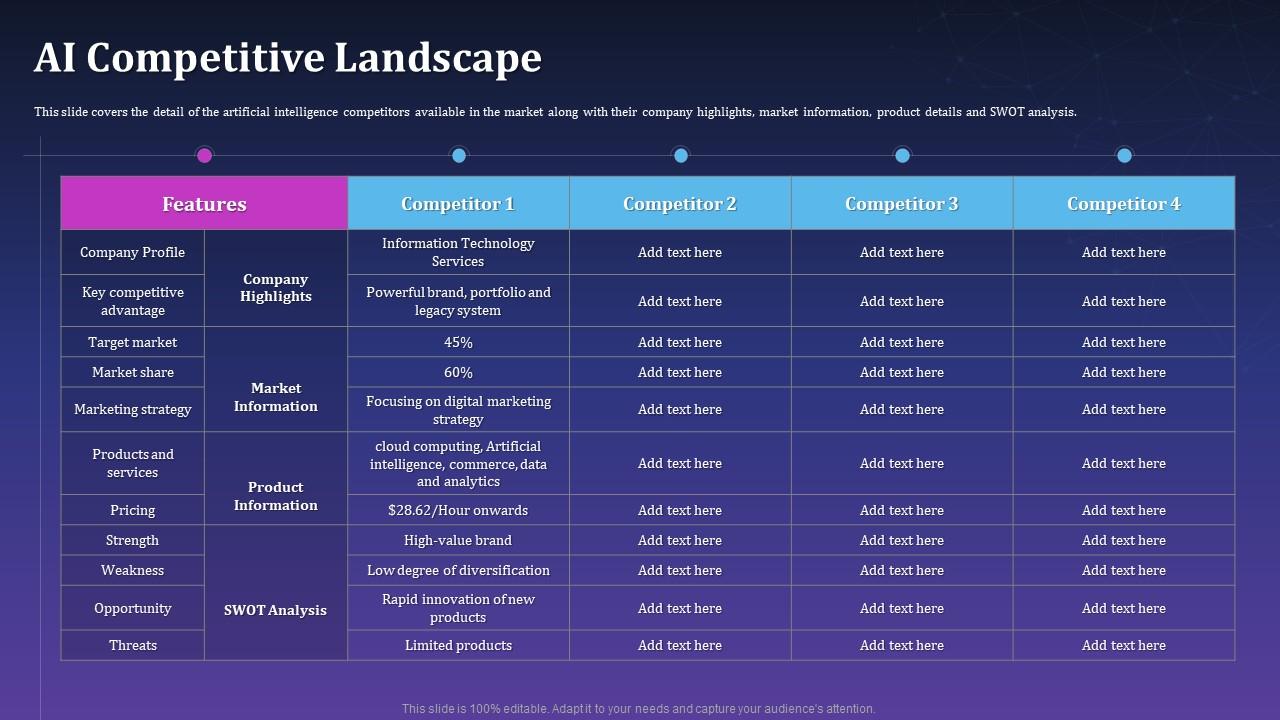Apple And Artificial Intelligence: A Competitive Assessment

Table of Contents
Apple's AI Strengths
Apple's foray into AI isn't characterized by flashy announcements, but rather a steady integration of intelligent features across its ecosystem. This approach has yielded several key strengths.
Siri and Voice Assistant Technology
Siri, Apple's virtual assistant, has evolved significantly since its inception. While not always perfect, it showcases Apple's commitment to AI.
- Strengths: Siri excels in natural language processing, understanding context and nuances in user requests better than some competitors. Its deep integration within the Apple ecosystem, allowing seamless control over devices and apps, is a major advantage.
- Weaknesses: Compared to Google Assistant or Amazon Alexa, Siri's third-party app integration is more limited. While accuracy has improved, it still occasionally provides inaccurate or unhelpful responses, hindering its overall usefulness.
On-Device AI and Privacy
Apple's steadfast focus on on-device processing for its AI features is a defining characteristic and a significant competitive advantage.
- Benefits: This approach prioritizes user privacy by minimizing the amount of data sent to Apple's servers. Processing happens locally, reducing reliance on cloud processing and enhancing security.
- Drawbacks: Processing AI tasks entirely on-device can limit performance and feature capabilities compared to cloud-based AI systems, which can access greater computational power and larger datasets for training.
Machine Learning Advancements in Hardware and Software
Apple's commitment to AI is evident in its continuous advancements in both hardware and software.
- Examples of applications: The A-series chips, featuring powerful neural engines, power features like advanced image recognition in the Photos app, predictive typing in the keyboard, and improved facial recognition for unlocking devices. Core ML, Apple's machine learning framework, facilitates the development and integration of AI features into apps.
- Future potential: These advancements lay the groundwork for future innovations in augmented reality (AR), personalized health features (like advanced health tracking and predictive diagnostics), and improved user experience across all Apple products.
Apple's AI Weaknesses
Despite its strengths, Apple faces some challenges in the competitive AI landscape.
Lack of Publicly Available AI Models and Data
Unlike Google, which openly shares many of its AI research and models, Apple maintains a more closed approach.
- Limited research collaborations and publications: Apple's relative secrecy hinders external collaboration and slows the broader advancement of AI research.
- Dependence on internal data for model training: This reliance on internally generated data limits the scale and diversity of the training data, potentially impacting the accuracy and generalizability of its AI models.
Competitive AI Ecosystem
Apple's AI ecosystem lags behind the comprehensive platforms offered by Google and Amazon.
- Developer tools and SDKs: While Apple provides developer tools, the breadth and depth of tools available to developers building AI-powered applications are less extensive compared to Google's TensorFlow or Amazon's SageMaker.
- Cloud services for AI development and deployment: Apple's cloud services for AI are less developed compared to Google Cloud Platform (GCP) and Amazon Web Services (AWS), impacting the scalability and ease of deployment for AI applications.
Integration Challenges and Fragmentation
Seamless integration of AI features across Apple's diverse range of devices and operating systems remains a challenge.
- Inconsistencies across different operating systems (iOS, macOS, watchOS): The user experience can vary significantly depending on the operating system, creating inconsistencies in AI feature availability and performance.
- Challenges related to data synchronization and cross-device functionality: Ensuring smooth data synchronization and consistent functionality across iPhones, iPads, Macs, and Apple Watches requires ongoing effort and improvement.
Apple's AI Strategy and Future Outlook
Apple's AI strategy hinges on user privacy and a superior user experience.
Focus on Privacy and User Experience
This approach, while limiting in certain aspects, positions Apple strongly in an increasingly privacy-conscious world.
- Ethical considerations in AI development: Apple’s focus on privacy directly addresses ethical concerns surrounding data collection and usage in AI systems.
- Long-term implications for the AI market: This strategy could influence the future of AI development, pushing the industry towards more privacy-respecting approaches.
Potential Future Developments
Apple's future in AI holds exciting possibilities.
- Augmented Reality (AR) and Virtual Reality (VR): Apple's advancements in chip technology and machine learning are poised to drive significant improvements in AR and VR experiences.
- Healthcare and personalized medicine: On-device processing and advanced sensor capabilities create opportunities for breakthroughs in personalized healthcare.
- Autonomous driving technology: While Apple’s involvement in this area remains less public, its expertise in sensor technology and machine learning positions it well for future contributions.
Conclusion
Apple's approach to "Apple and Artificial Intelligence" is distinctive, prioritizing user privacy and seamless integration within its ecosystem. While it possesses considerable strengths in on-device AI and hardware, it faces challenges in terms of a less open research approach and a less comprehensive AI ecosystem compared to major competitors. The key takeaways are that Apple's focus on privacy differentiates it in the AI market, and its future innovations in AR/VR, healthcare, and potentially autonomous driving are areas to watch closely. To stay informed about the latest developments in Apple and Artificial Intelligence, subscribe to relevant tech newsletters and follow industry news sources. The future of AI at Apple is undoubtedly intriguing and holds the potential for significant advancements in the years to come.

Featured Posts
-
 Woman Claiming To Be Madeleine Mc Cann Arrested For Stalking
May 09, 2025
Woman Claiming To Be Madeleine Mc Cann Arrested For Stalking
May 09, 2025 -
 The Daycare Dilemma Weighing The Pros And Cons For Working Families
May 09, 2025
The Daycare Dilemma Weighing The Pros And Cons For Working Families
May 09, 2025 -
 Walmarts Lowest Prices On Elizabeth Arden Skincare
May 09, 2025
Walmarts Lowest Prices On Elizabeth Arden Skincare
May 09, 2025 -
 9 Maya V Kieve Ozhidaemye I Neozhidaemye Gosti
May 09, 2025
9 Maya V Kieve Ozhidaemye I Neozhidaemye Gosti
May 09, 2025 -
 Ashhr Laeby Krt Alqdm Aldhyn Kanwa Mdkhnyn
May 09, 2025
Ashhr Laeby Krt Alqdm Aldhyn Kanwa Mdkhnyn
May 09, 2025
